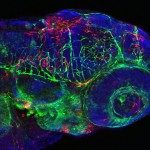Link to Pubmed [PMID] – 10196263
J. Virol. 1999 May;73(5):3709-17
During the late phase of adult T-cell leukemia/lymphoma, a severe lymphoproliferative disorder caused by human T-cell leukemia virus type 1 (HTLV-1), leukemic cells no longer produce interleukin-2. Several studies have reported the lack of the Src-like protein tyrosine kinase Lck and overexpression of Lyn and Fyn in these cells. In this report we demonstrate that, in addition to the downregulation of TCR, CD45, and Lck (which are key components of T-cell activation), HTLV-1-infected cell lines demonstrate a large increase of FynB, a Fyn isoform usually poorly expressed in T cells. Furthermore, similar to anergic T cells, Fyn is hyperactive in one of these HTLV-1-infected T-cell lines, probably as a consequence of Csk downregulation. A second family of two proteins, Zap-70 and Syk, relay the signal of T-cell activation. We demonstrate that in contrast to uninfected T cells, Zap-70 is absent in HTLV-1-infected T cells, whereas Syk is overexpressed. In searching for the mechanism responsible for FynB overexpression and Zap-70 downregulation, we have investigated the ability of the Tax and Rex proteins to modulate Zap-70 expression and the alternative splicing mechanism which gives rise to either FynB or FynT. By using Jurkat T cells stably transfected with the tax and rex genes or inducibly expressing the tax gene, we found that the expression of Rex was necessary to increase fynB expression, suggesting that Rex controls fyn gene splicing. Conversely, with the same Jurkat clones, we found that the expression of Tax but not Rex could downregulate Zap-70 expression. These results suggest that the effect of Tax and Rex must cooperate to deregulate the pathway of T-cell activation in HTLV-1-infected T cells.

